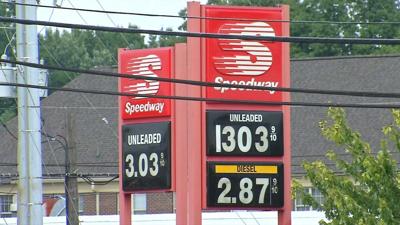LOUISVILLE, Ky. (WDRB) – A federal judge has thrown out a Kentucky lawsuit alleging that gasoline supplier Marathon Petroleum Corp. and its Speedway retail stations charge monopoly prices for cleaner-burning gas in Louisville and northern Kentucky, reaping hundreds of millions of dollars in ill-gotten gains from consumers since at least 2004.
In an opinion dated Monday, U.S. District Judge David J. Hale found “fatal shortcomings” in the report offered by Kentucky’s only expert witness in the case.
Former Kentucky Attorney General Jack Conway, a Democrat, filed the antitrust lawsuit in May 2015 as he was gearing up for an unsuccessful run for governor.
Conway’s lawsuit accused Findlay, Ohio-based Marathon, the largest oil refiner in the Midwest and the primary supplier of wholesale gasoline to Kentucky, of using illegal “anti-competitive” tactics to exploit a monopoly on reformulated gas.
The cleaner-burning blend known as RFG is required in Louisville and had been required in northern Kentucky at the time of the lawsuit. Whether the gas station is a Shell, BP, Speedway or other brand, 90% to 95% of the RFG sold in Louisville and northern Kentucky ultimately comes from Marathon, the state alleged in the lawsuit.
But Hale, of U.S. District Court in Louisville, found flaws in the report offered by Kentucky’s expert witness, Michael Sattinger.
For example, Hale said Sattinger failed to account for basic differences, such as population, between the Kentucky markets and other metro areas where Sattinger said there is a competitive market for reformulated gas, Baltimore and St. Louis.
Sattinger’s report remains shielded from public view by Hale’s court. But Hale’s opinion reveals that Sattinger found Kentucky consumers had been overcharged $173.6 million because of Marathon and Speedway’s alleged monopoly behavior.
Hale found that Sattinger’s methodology for calculating damages was not “reliable or based upon sound scientific principles” because he failed to “control for rudimentary differences” between Louisville and northern Kentucky and the comparison cities, Baltimore and St. Louis.
Hale dismissed Kentucky’s federal antitrust claims while sidestepping Kentucky’s claims that Marathon violated state law, meaning Attorney General Daniel Cameron’s office could start over by pursuing those claims in state court.
A spokeswoman for Cameron, a Republican who was elected last fall, said: "We are reviewing the court’s ruling and the underlying facts that led former Attorney General Conway to file suit in order to make an appropriate determination about any future action."
Marathon doesn't comment on legal matters, a spokesman said.
Gas prices in Louisville and the U.S. as a whole were significantly higher in the years leading up to Conway’s lawsuit than today. Retail prices hovered around $3.50 per gallon in 2013 and 2014 before a sustained drop below $3 per gallon that has lasted about five years, according to data from gasbuddy.com.





















